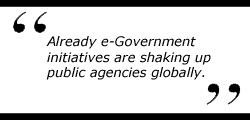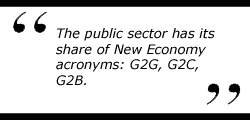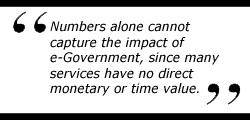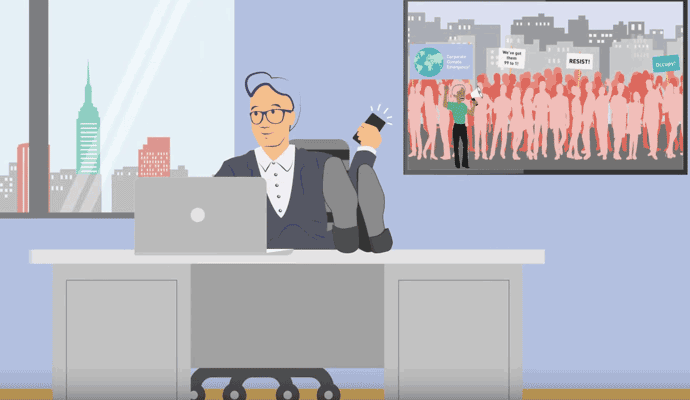Governments Go Digital: Citizens Get a Direct Connection
E-Government can be as simple as renewing driver's licenses online, as complex as supporting the growth of high-tech industries. Around the globe, e-Government is changing how public agencies serve citizens.
Think of public agencies, and such stereotypical images as long lines at offices and inattentive bureaucrats come to mind. Think again: Governments are using digital technologies to reinvent how they operate, complete with New Economy acronyms like G2G, G2C, and G2B. Opportunities to do things better and cheaper abound — they can be found wherever governments connect with citizens and businesses.

E-Government matters because it can intertwine, potentially, with almost all aspects of life, from taxes and health care to public safety and the workplace. Already e-Government initiatives are shaking up public agencies globally, dramatically changing the quality of services in both developed and developing countries. In the United Kingdom, for instance, a single portal connects citizens with services dealing with life transitions, such as having a baby, finding a job, and retiring. In Egypt, the government is teaming up with multinationals to create home-grown high-tech industries and e-skilled college graduates.
"Governments need to be built on the principles of quickness, lightness, exactitude, multiplicity, and transparency — the opposite qualities to those we traditionally associate with governments, which have tended to be slow, heavy, vague about their goals, and secretive," said Geoffrey Mulgan, director of the U.K. Cabinet Office's Performance and Innovation Unit. "E-Government plays into the new model."
Dr. Mulgan and Ahmed Nazif, the Egyptian Minister of Telecommunications and Information Technology, spoke about e-Government's challenges and opportunities in their respective countries at a session at the recent World Economic Forum in Davos, Switzerland.
Better Access, More Services
Gerd Wittkemper, a Booz-Allen & Hamilton senior vice-president based in Düsseldorf, Germany, and moderator of the Davos session, provided a framework for the specific types of e-Government, noting that the public sector has its share of acronyms to describe the new services it is developing. There is Government-to-Government (G2G) for common transactions (e.g., issuing driver's licenses and permits). Government-to-Citizens (G2C) is centered on the democratic process, particularly online voting. Government-to-Business (G2B) deals with deregulation and relations with the private sector. "All of the above are global trends," Dr. Wittkemper said, but the initiatives are country-specific.
For example, the extent of Internet access has a huge impact on countries' e-Government plans. In the U.K., the government aims to double the number of homes with Internet access from 50 to 100 percent within five years. In Egypt, where a low per-capita income precludes PC ownership for most households, the government is bypassing home access to create Information Technology Clubs. These are located in what Dr. Nazif termed "deprived areas," so residents can use the Web by the hour, at one-tenth the cost of what they would pay in a Cairo Internet café.
Egypt Builds the Foundations
In Egypt, technology and e-Government are integral to the country's development plans. Dr. Nazif leads the year-old "Techno-Egypt" program, strongly supported by Egyptian President Hosni Mubarak. "Without that kind of commitment at a very high level, there is no guarantee of e-Government success," Dr. Nazif said.
Techno-Egypt focuses on building home-grown IT and telecom industries and professionals, so the country will not be dependent on imported technology and content. The government has teamed with multinationals, including IBM, Cisco Systems, and Oracle, and Egyptian companies to teach e-business skills and certify the proficiency of 5,000 university graduates annually. "Our efforts are starting to pay off," said Dr. Nazif. "Hundreds of software engineers and new entrepreneurs are discovering Egypt, and, in the process, creating a very strong local industry."

Such development partnerships are attractive to foreign investors and are a boon for the local market. "By relying on our own population, multinational companies can create the industry more cost effectively than in the developed world," Dr. Nazif explained. "Even with a shortage of IT professionals in Egypt, we still need to look within and work to develop from inside. For the multinationals, that's a 'win-win' situation — they're getting products and services at a lower cost, and opening up their markets."
Her Majesty's Internet Service
As a developed country, with a strong e-commerce market (it was Europe's largest in 1999), the U.K. has a solid foundation upon which to build its e-Government strategy. It revolves around several initiatives, with universal Internet access the top priority. To double the access to 100 percent, the government is combining regulatory pressure to lower access rates with subsidized PCs for low-income families, as well as increasing public availability through libraries, neighborhood centers, and Internet cafés.
The U.K. plans to have all government services online by 2005. A single portal already connects citizens with services dealing with life transitions, such as having a baby, finding a job, and retiring. A big challenge is to find the right mix of online, telephone, and in-person delivery channels. In health services, for instance, citizens have access to online diagnostic information and 24-hour phone advice, plus face-to-face help from doctors and nurses. "Online is often not a replacement of other services, but it helps you to reconfigure the mix," Dr. Mulgan said.

Public agencies are using e-Government to work more closely with private and volunteer sectors. For example, the government funded the British Broadcasting Corporation and other groups to create a database of volunteer opportunities.
Also, e-Government enables citizens to peer deeply into an agency's performance, such as through online viewing of school, hospital, and police performance scorecards. For their part, quality-minded agencies are using the Internet to share best practices directly among themselves, without waiting for directives to filter down from the head offices.
Measuring the Impact
Lower costs and service enhancements are obvious metrics to measure success. For example, Dr. Mulgan said that paying benefits directly to a recipient's bank account reduces the transaction cost 50-fold. Egypt's e-procurement program should save the government 200 million pounds annually. There are also time savings for citizens. "Say you're due for a driver's license in a week and you get it in two days; that is easily measured," Dr. Nazif noted.
But numbers alone cannot capture the impact of e-Government, since many services have no direct monetary or time value. "How do we measure people's sense of safety or health? Governments that put too much weight into believing this can be explained in a quantitative way will find their citizens are unhappy," Dr. Mulgan said.
Consider the benefit of a digital connection between the governed and the government. Interactivity means citizens have a direct line to officials to voice their ideas and needs. The experience can be eye-opening at the receiving end. As Dr. Nazif said, "At the ministry we have a Web site where we receive suggestions. As a decision-maker it has opened up a new window and expanded my channels of input tremendously. It's one thing to sit in my office and listen to my advisors; with the Web I can multiply those channels by thousands, which is a real value-add to how I perform my job."
| Authors
Van Wallach, wallach_van@strategy-business.com Van Wallach is senior writer for strategy+business based in New York. |


